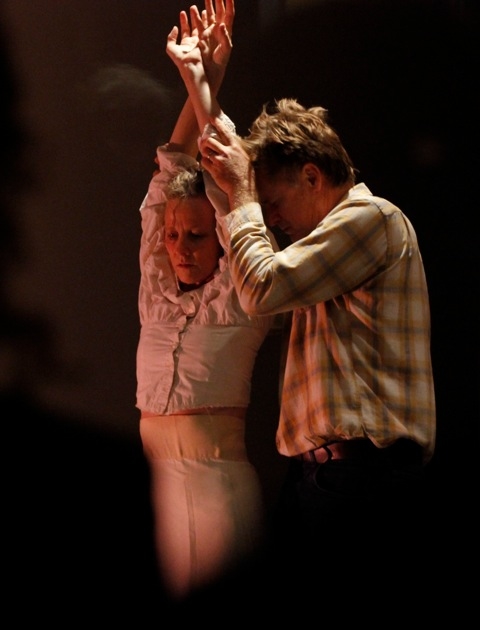Bill Pullman and Liz Lerman Share Stories of War and Healing
Lerman’s new dance piece, ”Healing Wars”, stars Pullman and his wife, Tamara, at Arena Stage.
Bill Pullman, star of films like Spaceballs and Independence Day, isn't someone you'd expect to appear in a dance piece. Yet the well-known and recognizable actor is doing just that, along with his dancer wife, Tamara, in a new show devised by choreographer Liz Lerman called Healing Wars. Now running at Washington, D.C.'s Arena Stage, the show explores how healers are tasked with treating battle scars, both emotional and physical. Pullman and Lerman spoke with TheaterMania about their experiences crafting Healing Wars and the fact that even though Pullman isn't a natural dancer, everyone can be taught to move.

Liz, tell me about the creation of Healing Wars. Where did the idea come from?
Liz Lerman: My husband is a storyteller and he was commissioned to do a new piece at Ford's Theater on Lincoln. I was backstage, and that's when I heard that all of Washington was going to be celebrating the one hundred fiftieth anniversary of the Civil War. I started thinking of all the new scholarship that I was sure existed since the last time we thought about that war. My initial interest was women, and that eventually got me to nurses, and finally just people who are involved in healing and what [healing] is when you're in conflict. We know that trauma travels through generations, but I was also thinking about how love travels through generations. I started getting this idea around May, June 2011. I had been working with Tamara Pullman, and Bill and I had gotten to know each other. Bill and Tamara were able to do research with me that fall.
Bill, how did this project come to you?
Bill Pullman: It wasn't really a normal channel. I had always enjoyed coming to see Liz's pieces with Dance Exchange, and Tamara's been part of things. Liz was inviting me to be part of a whole shift, so right away this was a different kind of paradigm because it was meant to be a theatrical dance piece. It was physical movement. There would be more theater and text work. I have always had interest in docudrama. We have people in our production [who] did Sleep No More, so there is this kind of cross-fertilization of fields in this piece.
Liz Lerman: I was really interested in having, after all these years, a real actor, and not asking dance performers to use text. Because Bill is interested in documentary material, he was incredibly helpful in finding material and shaping it.
Will we see you dance, Bill?
Bill Pullman: [laughs] I've always said that's a good question. When I tell people in Montana I'm involved in a dance piece with Tamara, they go to the tutu right away. They can't resist. I do have physical movement. Liz always has good vocabulary to discuss this. I'm just a guinea pig.
Liz Lerman: When you get people who people don't expect to move, like your question suggests, I think it's a great jolt for an audience, to expect something new or different. It brings fresh eyes for all of us. I'm really grateful for Bill's willingness and he does a great job.

(© Helen Shariatmadari)
Does having a real-life couple like Bill and Tamara enhance the piece?
Liz Lerman: I have always felt it matters who's onstage. In my work, especially when we're building a work, it really matters who the who is. Maybe this comes from a movement version of developing characters. People in this piece are characters, but they bring who they are [in real life]. The fact that Bill and Tamara are a couple and have been together for a long time was important to me as I thought through these legacies of war, conflict, and healing, and how that works.
Bill Pullman: Tamara and I met when we were cast in a Molière piece in college. We haven't really performed together since then. That's part of why this has been such a privilege to work on. To have these times onstage where I'm relating to her, there are moments where it gets really fugue-y. We're characters, but the intimacy is pretty raw and exposed, more so than I thought it would be. I think I've acted intimacy, so it gives my body a little embarrassed flush when it's actual intimacy.
What kinds of correlations have you discovered between the various wars while putting this piece together?
Liz Lerman: When I went to the National Museum of Civil War Medicine, I found a whole room of photographs of amputees and I said, "Oh my goodness, this is going on right now." I let these characters wander between wars, and I was concerned that I was making a mistake. I wasn't really sure about it until we found an amazing book that compared the Vietnam War veterans returning home to the Civil War veterans. That's when I really felt I made the right decision. It turns out, even though I thought Civil War veterans came home and everything was fine, that's not the case. The history is quite different from that. Hearing it in the past comforts the present. When we were auditioning veterans [for the cast], one said that's something he'd never heard. But it's somewhat true.








